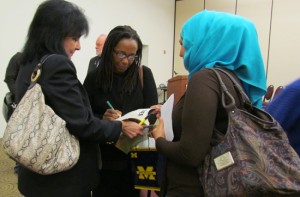
 Photo caption: Heather Williams signed her book, “Self-Taught: African American Education in Slavery and Freedom,” for LEO lecturer II Sharon Werner and student Afrah Alzayadi. Williams, professor of history at University of North Carolina, was on campus Tuesday to lead this semester’s “A Conversation on Race.”
Photo caption: Heather Williams signed her book, “Self-Taught: African American Education in Slavery and Freedom,” for LEO lecturer II Sharon Werner and student Afrah Alzayadi. Williams, professor of history at University of North Carolina, was on campus Tuesday to lead this semester’s “A Conversation on Race.”
That, said Heather Williams, was a shared belief between elite whites and enslaved African Americans during the 19th century and a key reason why Southern states passed laws making it illegal to teach enslaved people to read.
Williams, professor of history at University of North Carolina and author of “Self-Taught: African American Education in Slavery and Freedom,” spoke on campus Tuesday as part of UM-Dearborn’s “A Conversation on Race” lecture series.
But the laws against literacy did not deter many enslaved people who were determined to be educated.
Williams spoke of “pit schools” formed in trenches on plantations, where enslaved people secretly held lessons. She described secret lessons held on Sundays while white slave owners were at church. Slaves “patched together” their literacy, breaking the code. Those slaves who learned to read helped others.
“Slaves were suspected of being teachers. And with very good reason,” she said.
After slavery ended, former slaves hungered for education, bringing in white missionaries from the North when demand exceeded supply. They had faith in education; they’d seen that powerful people had been educated.
But even as African American men advocated education as a civil right, bringing opportunities for all children—including poor white children in the South—education was seen as a threat to the balance of power between whites and blacks.
“When slavery ended, racism didn’t go away,” Williams said. Its shape just shifted and has continued to do so in the 150 years since slavery ended.
In her lecture, Williams advocated for continued honest discussion of racism, saying that people often only talk about race—and superficially at that—when responding to an issue or crisis.




